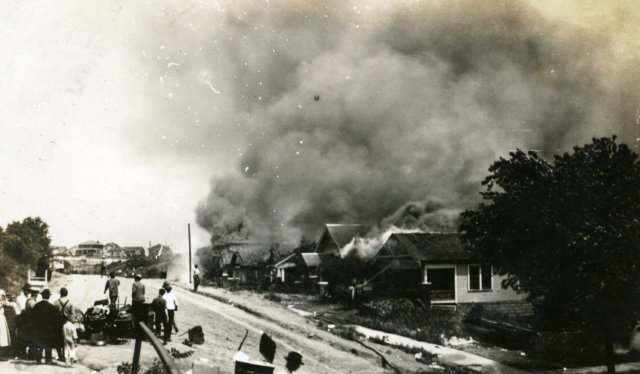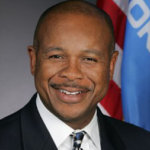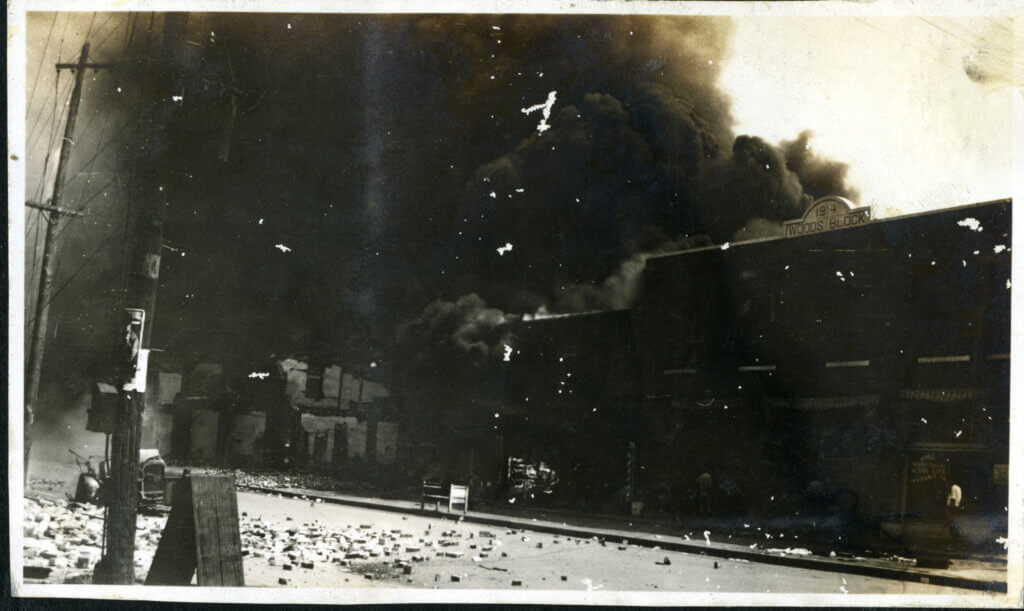
One of the biggest blights in Oklahoma’s history could be turned into a positive for the Tulsa area, as state officials form an interim study to create a commemoration of the Tulsa Race Riot of 1921.
State Sen. Kevin Matthews (D-Tulsa) has proposed an interim study to examine state properties and facilities with National Park or Federal Historic designations and the economic impact to the area. Matthews said he is putting a specific emphasis on the 100-year anniversary of the Tulsa Race Riot coming up in 2021.

“I wonder if those kinds of designations enhance tourism?” Matthews said.
In addition to the National Park and Federal Historic designations, Matthews said he is particularly interested in finding out more about what it takes to become a Smithsonian Affiliate. The senator intends to travel to Washington, D.C., to gather more information on the designations.
The interim study was assigned to the Senate Business, Commerce and Tourism Committee, but a meeting has yet to be scheduled to publicly discuss the issue. Chairman Sen. Dan Newberry (R-Tulsa) said he will review the details of each interim study proposal and then schedule those he intends to hear sometime in October.
Sen. Matthews: ‘We want to turn that tragedy into triumph’
Although the origin of the Tulsa Race Riot is up for debate, the Greenwood Cultural Center, which describes itself as the “keeper of the flame for the Black Wall Street era” as a whole, claims it began on an elevator in the Drexel Building when the elevator attendant – a 17-year-old white female – screamed. Also on the elevator at that time was 19-year-old Dick Rowland, a black shoeshine worker.
What caused the scream was never determined – some say Rowland tripped and fell into the attendant – but it was Rowland’s arrest that led up to the Tulsa Race Riot. An unarmed mob consisting of several hundred white people showed up outside the Tulsa County Courthouse, demanding that Rowland be handed over to them. The sheriff turned them away.
A few dozen black men came armed to the courthouse in an effort to provide assistance to the sheriff in protecting Rowland. At some point, an accidental or warning shot was fired and the Tulsa Race Riot began. Although accounts vary, several white and black men died during the violent exchange.
“We want to turn that tragedy into triumph,” Matthews said.

‘We still have these issues’
With white supremacists making headlines in Charlottesville and the NAACP exploring options to end perceived racism in Missouri and the NFL, clearly some of the societal issues of 100 years ago remain today. Lessons that could have been learned from episodes like the Tulsa Race Riot seem to have been forgotten as racism still frequently emerges throughout the nation.
“We’ve got to create a better world,” said Bob Blackburn, executive director for the Oklahoma Historical Society. “If one person died, it is worth our effort to find out why.”
With so many inconsistent accounts of the race riot, Blackburn noted the actual body count from the event remains unconfirmed. Debate surrounds who started it, why it started and how it got out of hand, but Blackburn said accusations that the white business community supported this conflict, however, simply fail to reflect history.
“Some people want to claim it was an economic war,” Blackburn said. “The Chamber would have been applauding a prosperous Greenwood community.”
Blackburn said the business people in the area were more focused on Black Wall Street’s economic positives. He said white bankers and property owners benefited from black entrepreneurs thriving in the area. At the same time, the growing depictions of black heroes during World War I combined with remnants of the Jim Crow South led to tensions that sparked a powder keg during that Memorial Day weekend.
“Those were the two extremes,” Blackburn said. “There is still some of that sentiment in the community – we still have these issues of race and economic inequity.
“If we can create a community that is talking about these issues, I really believe it will have an impact on the quality of life, an impact on our children learning. We’ve got to deal with these issues. They are not going to go away on their own.”
How best to designate the commemoration
Matthews said he is interested in finding out if there is some type of designation that could help enhance tourism and community development in this area as community leaders prepare for the centennial commemoration of the Tulsa Race Riot.
One such possible designation is the Smithsonian Affiliate, which has been designated at over 200 sites in 46 states and U.S. territories. Three such designations exist in Oklahoma – the Oklahoma History Center, the Science Museum of Oklahoma and the Stafford Air and Space Museum in Weatherford. Among the benefits of a Smithsonian Affiliate designation are a dedicated team, object loan assistance, Smithsonian programs and exhibits, membership benefits, national promotion, professional development, collaborative funding and special access.
“Those things would be available and enhanced at the Greenwood Cultural Center,” Matthews said. “If we had the D.C. connection, we would have a model.”
Overall benefits of this model
Senate Bill 17 passed earlier this year to allow the Oklahoma Historical Society to serve as the administrators of the 1921 Tulsa Race Riot Centennial Memorial Revolving Fund. Blackburn said SB 17 would allow the agency to maintain a revolving fund for commemoration monies.
Blackburn said this was a common way to raise money for a project. He cited the George M. Murrell Home – generally referred to as Hunter’s Home – in Tahlequah as an example.
“This is a model that really has been evolving since the 1960s,” Blackburn said.
As for National Park and Federal Historic designations, Blackburn said the Skirvin Hotel is one such location that has benefitted immensely from being placed on the Federal Historical Registry. Oklahoma has over 1,300 Federal Historic designations as well as a handful of National Park designations.
Data provided by the Oklahoma Department of Tourism show Oklahoma tourism as the third-largest revenue generator in the state, with $8.6 billion in travel-spending revenue. State appropriations to the agency have been cut by 46 percent since 2009, however, which is causing concern about the state’s ability to continue marketing itself as a destination for tourism.
Although data showing economic benefits due to specific designations are scant, a report conducted by Dean Runyan Associates November 2016 for the Tourism Department shows tourism benefiting Matthews’ Senate District 11 by $33 million in overall earnings and another $11.7 in state and local revenue. Oklahoma’s top-earning senate districts include Senate District 14 (which has Lake Texoma, Lake Murray and Lake Arbuckle) at $172 million and District 44 (which includes most of southwest Oklahoma City) at $146 million.
Kim Caplinger, director of public policy and research for the Oklahoma Tourism and Recreation Department, said data from 2015 show 21.8 million people visited Oklahoma. In that year, tourists spent $8.6 billion and generated $634 million in state and local tax revenue.
“Tourism is a major revenue generator for Oklahoma and is the third-largest export-oriented industry in the state on a GDP (gross domestic product) basis,” Caplinger said. “Tourism serves to diversify Oklahoma’s economy and continues to show steady growth. In fact, over the last six years, jobs and payroll supported by travel spending have increased each year, along with core non-transportation visitor spending and state and local tax revenues generated.”






















